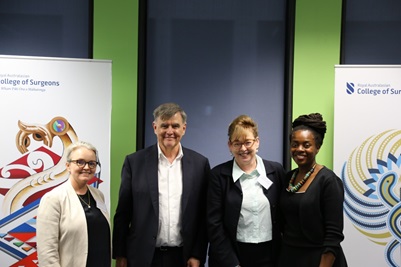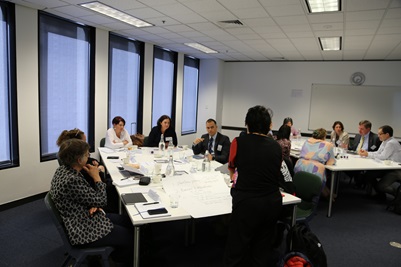2024 | Volume 25 | Issue 2

(Image: left to right: Dr Bridget Clancy, Professor Brendan Murphy AC, Associate Professor Kerin Fielding, and Dr Kudzai Kanhutu)
On 9 February, RACS and the Office of the National Rural Health Commissioner held a National Rural Surgeon Training and Retention workshop in Melbourne.
Almost 60 delegates across 24 stakeholders, including RACS President Associate Professor Kerin Fielding, RACS CEO Stephanie Clota, regulatory bodies, and specialist medical colleges, engaged in various table activities and discussions. Chaired by Professor Brendan Murphy, the workshop served to identify the levers and barriers impacting rural surgical training and retention throughout Australia. The outcomes of the workshop will also support the Flexible Approach to Training in Expanded Settings (FATES) Rural Training Models project.
Through a series of discussions, five key themes were identified:
1. the need for flexibility in accreditation and supervision and support for accreditation
2. further improvement of opportunities for selection
3. leadership in workforce planning
4. governance and resources to operationalise rural training
5. collaboration and partnership.
RACS CEO Stephanie Clota said, “The National Rural Surgeon Training and Retention workshop represented a significant milestone in the implementation of the Rural Health Equity Strategic Plan, advancing our commitment to enhance rural surgical training and retention. Our goal is to expand the number of rural surgical training sites, bringing us closer to bridging the health equity gap. The workshop delivered new insights and an overview of local strategies that are making an impact. These will guide the development of actionable solutions enabling better access to surgical care for rural communities.”
The workshop also served to support the FATES Rural Training Models project currently being undertaken by RACS in consortium with Royal Australasian College of Medical Administrators (RACMA), Royal Australian and New Zealand College of Ophthalmologists (RANZCO), Royal Australasian College of Physicians (RACP), and Australian & New Zealand College of Anaesthetists (ANZCA).
An outcomes of the workshop will be released in the coming weeks.
